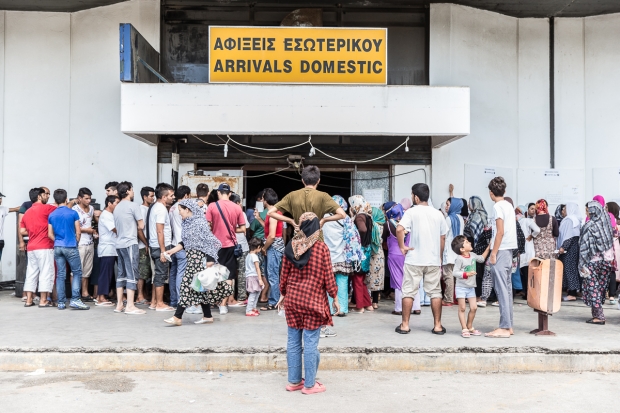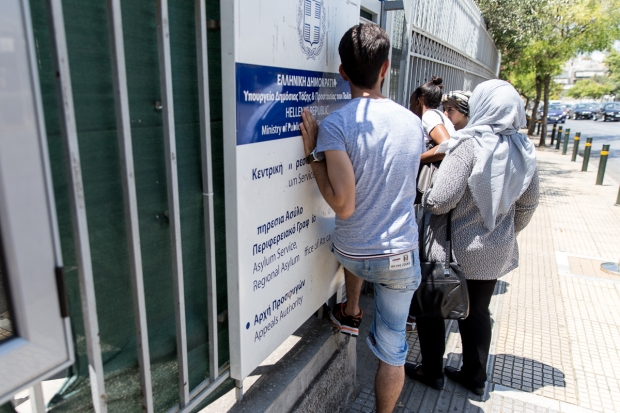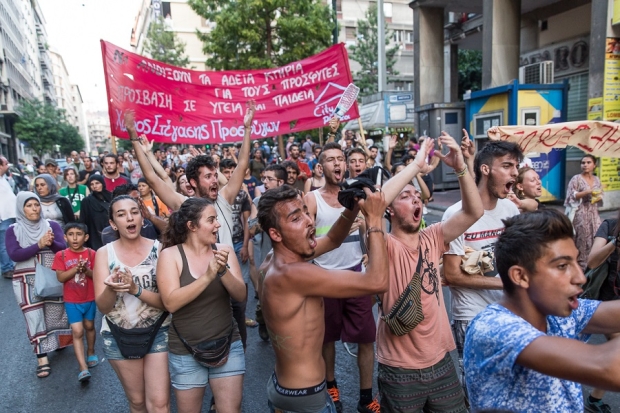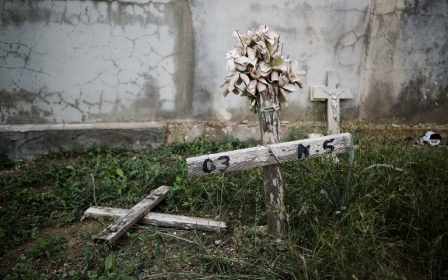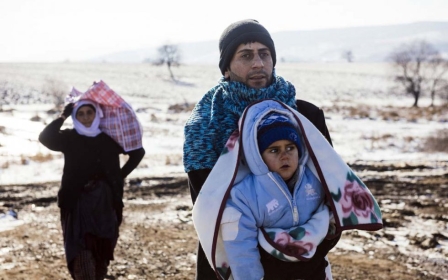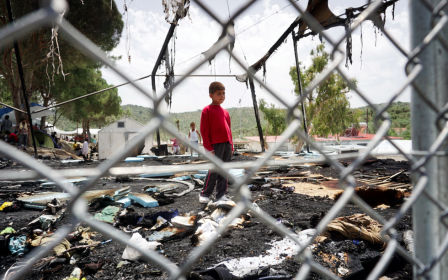Refugees: 'A quick death in Syria, a slow death in Europe'
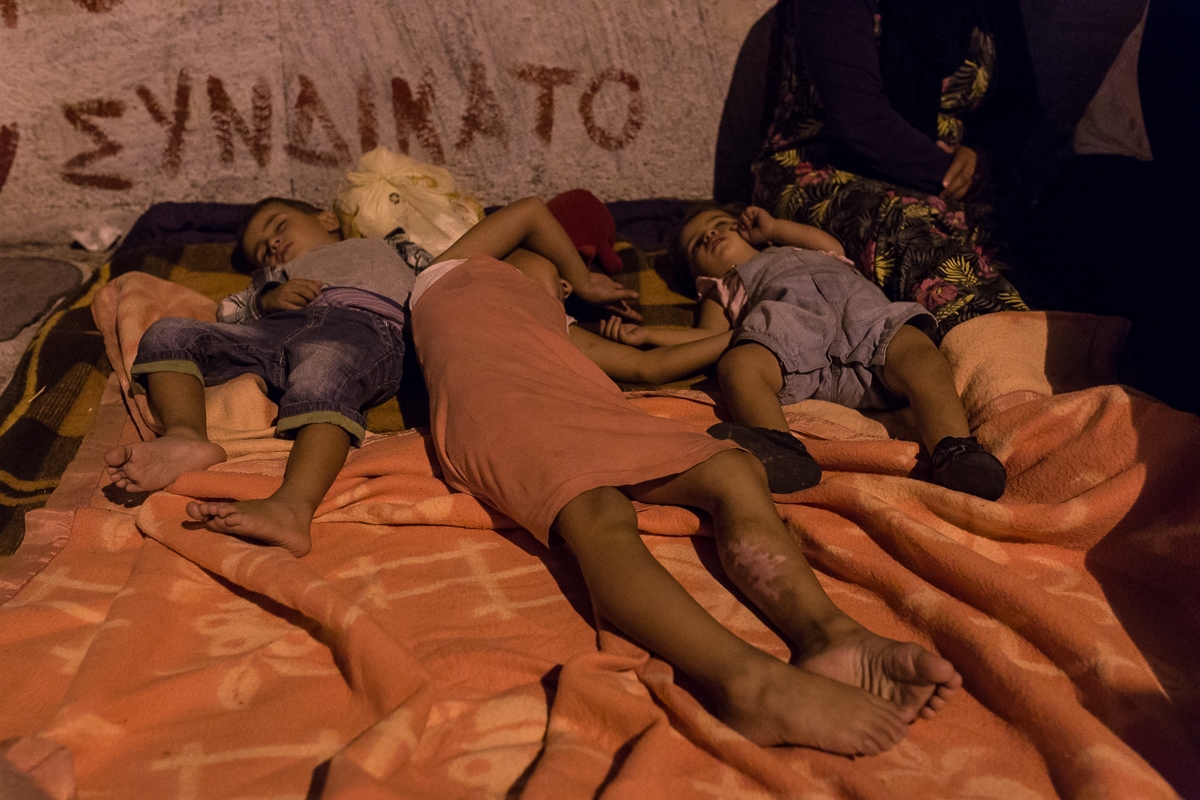
ATHENS - Returning from a night on the town, passersby stroll past clusters of refugees lying on blankets along a dingy Athens sidewalk. Two Syrian men, speaking in low voices, sit in front of a nearby shop, keeping a watchful eye over their families.
Rasul al-Sobhi, 23, from Diyala province in Iraq, sits apart from the pair, preferring to stay close to his wife and children. It is a hot night and Rasul keeps a hefty stick tucked under their blankets in case he has to defend them; like any big city, crime is common in downtown Athens. He speaks to the media reluctantly: “Will it help us?” he asked sourly.
His wife Taysea, 22, explained Rasul’s cynicism. “We’ve been sleeping in the park,” the young mother of two said, “because we’re too scared to sleep on the streets… it’s full of gangs. We came here because they keep saying they’ll help us and it hasn’t happened yet.”
Refugees in legal purgatory
The closure of the Balkan route and the resettlement deal between Turkey and the EU have exacerbated an already dire situation, with the European Commission still trying to push through its scheme to distribute 66,400 qualified asylum seekers across Europe. In theory, the scheme means relocation to one of the participating member states. In practice, however, the system is working so slowly that over 57,000 refugees have been trapped in bureaucratic limbo in a struggling Greek state. They are stranded in this legal purgatory, unable to work and living in desperate conditions while they wait for their asylum claims to be processed.
This particular group of Syrian and Iraqi families have decided to install themselves on a pavement outside a branch of Praksis, a Greek NGO which offers medical assistance and shelter to refugees and homeless Greek nationals. This is their last-ditch attempt to pressure the organisation into providing them with shelter. Unfortunately, though, it is unable to help.
Marianella Kloka, Praksis's advocacy officer, explains that an asylum seeker's eligibility for shelter falls under a strict set of regulations that includes first determining whether they are eligible for relocation. “They have to be pre-registered and then fully registered by the Greek Asylum Service," she says - a process that can take months. "They then have to be directed to the UNHCR before they can come to Praksis through a specific procedure, to place them in Athens or Thessaloniki.”
Outside, Taysea cuddles her sleeping baby and holds out a Praksis medical report. “She’s severely asthmatic,” she says of her seven-month-old, who is frail enough to pass for three months. “She needs medical care and she needs to be in a better environment.”
The cost of falling through the cracks
Although the pre-registering process provides asylum seekers with a temporary residency card, which affords them limited legal status in Greece, it does not grant them the right to work. Moreover, there could be a delay of months between pre-registration and registration, during which time refugees must find a way to survive.
When they were interviewed by Middle East Eye, in late July, the Sobhi family's appointment for registration had not yet been determined. As they are unable to qualify for shelter until after they have gone through the lengthy process of being registered and slated for relocation, they are theoretically supposed to be housed in any one of the government’s numerous refugee camps, or "open accommodation sites", as they are officially termed. However, that option is also beset with obstacles.
One of the Syrian men watching from the stoop speaks from his perch. Cwan, 26, declines to give his real name; he flashes a grin and instead uses the name of the popular Kurdish folk singer, Cwan Haco. Since arriving at the Greek mainland from Samos Island, he has wandered throughout the greater Athens area in search of shelter and been rejected by every official camp he approached.
“The Asylum Service office in Samos told me I had to leave the island within 10 days,” Cwan said. “When I came to Athens, the Asylum office here said to me, ‘You don’t have an appointment for another three more months; why are you here now?’ I asked them, 'What am I supposed to do while I wait? I’m sleeping in the streets.' They told me to figure it out.”
Cwan has extensive knowledge of the camps and squats in Athens, as well as painful familiarity with the bureaucratic mechanisms of the asylum relocation process. As a young single male, considered the least eligible for services, he has adapted out of necessity. He recounts his attempts to find shelter in government-sponsored accommodation facilities. “I went around to all the camps, Eleonas, Elliniko, Skaramangas, no one took me in.”
A Syrian woman nearby chimes in while her two children sleep on a dirty blanket next to her. She displays their temporary asylum cards; their registration appointment is not until December.
“That’s half a year,” says Khulood al-Issa, 29. “They said new people coming from the islands are forbidden from entering the camps. We came from Lesbos Island. They wouldn’t let us in.”
“When I went to Skaramangas [camp], I pitched a tent in front of it for two days,” Cwan says. “No one spoke to me or even asked me what I was doing in front of the camp. Not a single organisation took me inside the camp or gave me information.” He pauses. “No one took me in. As you can see by your own eyes, I’m sleeping on the street.”
Aikaterini Kitidi, a UNHCR spokesperson, confirmed that it is not possible for new arrivals from the islands to be offered shelter in an official camp without a referral. “It is not possible for a person to knock on the door of a site and ask to be accommodated there without prior coordination.”
“There is a clear lapse in the mechanism that places asylum seekers in official camps,” she said. “This is why some people are staying in the streets or camping outside the sites.”
Kitidi said the Greek authorities, with the support of UNHCR, are making efforts to establish a viable solution "so that the people who come from the islands will have the possibility to complete their asylum applications in appropriate conditions”.
On any given night, it is common to find refugees sleeping in the main squares and side streets of Athens’ downtown districts. To them, the matter of finding shelter immediately is more vital than fixing the "lapse" in the bureaucratic mechanism that operates the asylum process.
Cwan is fed up with life on the streets. “I’m going to stay another week and see if things work out,” he said. “After a week, I’m going back to Turkey. How long am I supposed to tolerate living in the street?”
'They can’t have a good life here and they can’t move forward'
Later that week, on a hot summer afternoon, hundreds of refugees and solidarity activists take to the streets, demanding better conditions and shelter for refugees. One group of Syrians holds a banner that reads, “A quick death in Syria, a slow death in Europe”. Chants of “Freedom” and “Open the cities, open the borders” emanate from Athens' crowded Omonia square.
Nasim Lomani, an active member of the Solidarity Initiative for Political and Economic Refugees in Athens, said the purpose of the protest is to highlight the flaws in EU immigration policy.
“The policy of the EU is to reject refugees, close the borders and trap them. They cannot have a good life here in Greece, at the same time, they cannot move forward to other countries,” he said, critical of the stagnant pace of the asylum-seeking and relocation bureaucracy.
It’s no secret that the process is sluggish. Even the European Commission admitted as much in its latest progress report: “Overall, progress remains unsatisfactory... few relocations have taken place since mid-April, though the pipeline of future relocations has been strengthened.”
Meanwhile, of those 66,400 eligible asylum seekers supposed to be relocated by September 2017, only 2,735 had been relocated by July 2016 - a mere four percent of the targeted outcome.
“This creates a lot of frustration for the relocation candidates,” Kitidi said. The low rate prolongs the stay of refugees in Greece, which in turn increases the accommodation that the state must provide, which in turn increases the number of refugees in the streets.
'Try your luck'
Earlier in the day, before demonstrating in Omonia square, Lomani stood outside City Plaza, a large refugee squat established by activists in April. Once an abandoned hotel, it now houses about 400 refugees of all nationalities. Its residents are among the lucky few who managed to find space before it reached maximum capacity.
Rasul and Taysea were there, among several refugee families sitting outside the entrance, in hopes of being granted entry. More than a week after MEE first spoke to them, they were still living on the streets and seeking a place to stay.
“We don’t have space,” Lomani tells them, through an Arabic translator. The refugee hotel is fully occupied and Lomani has the difficult task of telling them that the other squats in Athens are likely to be full, too.
Run in conjunction with solidarity and Left-wing activists, squats have limited capacity and can rarely accommodate new intakes. Furthermore, these squats and informal camps are under constant threat of government eviction.
“You can try your luck,” Lomani says to the Sobhi family, a sentence he has regretfully uttered to countless others who came to the hotel seeking shelter. “But everywhere is full.”
New MEE newsletter: Jerusalem Dispatch
Sign up to get the latest insights and analysis on Israel-Palestine, alongside Turkey Unpacked and other MEE newsletters
Middle East Eye delivers independent and unrivalled coverage and analysis of the Middle East, North Africa and beyond. To learn more about republishing this content and the associated fees, please fill out this form. More about MEE can be found here.


